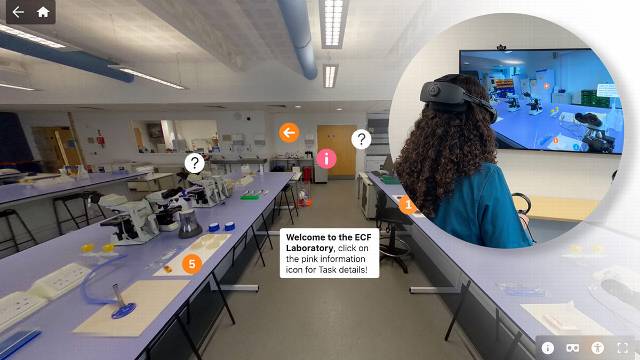
With the return of in-person academic conferences, Harper Adams academics have been presenting papers across the globe once more this summer.
Harper Adams Senior Lecturer and Principal Investigator of the Hands Free Farm, Kit Franklin, Senior Ag Tech Engineer Mike Gutteridge and Harper Adams Elizabeth Creak Chair of Agri-Economics, Professor James Lowenberg-DeBoer each recently visited the International Conference on Precision Agriculture in Minneapolis – with two more colleagues, Elizabeth Creak Chair in Agri-Tech Economic Modelling, Professor Karl Behrendt and Harper PhD student AKM Abdullah Al Amin, joining virtually.
The conference marked another keystone for the Hands Free Farm Project – as Kit explains in this blog.
It was absolutely great to get out to America and to present work on Hands Free Farm at the International Conference on Precision Agriculture in Minneapolis.
I’ve done quite a few commercial international conferences but this was the first academic conference where we have presented our work on the Hands Free Farm. Most of the conferences I’ve spoken at internationally about HFF were aimed at manufacturers and farmers – so it was good to talk about our work with fellow academics!
The Farm – and its predecessor the Hands Free Hectare - were the first in the world to grow, tend and harvest a crop without operators in the driving seats or agronomists on the ground.
The Farm has been run as a three-year project, and our harvest later this year will be the last in that three-year arc.
The Hands Free Farm team presented three papers during the robotics section on our work with autonomous agriculture – one by me, on by AKM Abdullah Al Amin and one by Mike Gutteridge.
My presentation was about highlighting the agronomic, agroecological and regenerative farming opportunities which were highlighted in the HFF work.
There are many lessons to be shared from our field work, which demonstrated that crop production with small-scale autonomous agricultural machines was possible.
These small-scale lighter machines have the possibility to improve soil health by reducing compaction - improving yields and reducing farm energy requirement by reducing need for compaction mitigation tillage, as well as enabling increased resolution precision farming.
For instance, one area people are looking at is reducing inputs – ideally, you’d want more diverse cropping systems with multiple crops in one field rather than a monoculture.
However, the way our current mechanisation runs is prohibitive and won’t allow you to do that - whereas the smaller equipment used within HFF could be rapidly rolled out to crop in a strip cropping system where you grow various crops next to one another.
My full presentation and slides can be seen via this ResearchGate link.
For me, the Conference was a great experience - presenting to leading academics from the international precision farming world, as well as supporting my other Harper Adams colleagues too.
That opportunity to discuss ideas and the future of sustainable farming practices was great – particularly in person after the past few years!
It was marvellous to be simply be back physically in a room and to be able to have those out-of-session informal conversations.
As a team at Hands Free Farm we managed to do a lot of online talks during the pandemic – but you do not get that person to person discussion and ideas and the thoughts that come from that.
For instance, the keynote speaker at ICPA was Professor Robert Sparrow, a Philosophy Professor from Monash University in Australia.
He was speaking on the ethical implications of agricultural robotics and AI. I ended up having a lot of conversations with him, as we had some differing opinions on robotics and the way they impact the future of the human race – which is the kind of thing it’s much better to discuss in person!
Simply getting to meet a lot of the people whose papers I have read, or who I have seen talked about in the worlds of autonomous agriculture and robotics was something very worthwhile as well. It’s great to be able to meet them in person (and sometimes find out they knew about our work too!)
You meet people from across the globe - and it’s all about making those connections which may lead to future projects and collaboration.
 Blog: Veterinary Medicine students step into immersive 360° laboratory
At Harper & Keele Veterinary School, students are stepping beyond the traditional microbiology bench and into an immersive 360° labo …
Posted
Yesterday
Blog: Veterinary Medicine students step into immersive 360° laboratory
At Harper & Keele Veterinary School, students are stepping beyond the traditional microbiology bench and into an immersive 360° labo …
Posted
Yesterday





